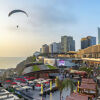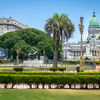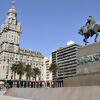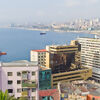33 Nights | SOUTH AMERICAN SILHOUETTES
You will visit the following 21 places:

Lima
Lima is the capital and largest city of Peru. It is located in the valleys of the Chillón, Rímac and Lurín rivers, in the central part of the country, on a desert coast overlooking the Pacific Ocean. Together with the seaport of Callao, it forms a contiguous urban area known as the Lima Metropolitan Area. With a population fast approaching 9 million, Lima is the fifth largest city in Latin America, behind Mexico City, São Paulo, Buenos Aires and Rio de Janeiro. Lima is home to one of the largest financial hubs in Latin America. It has been defined as a beta world city by GaWC international rankings. It was founded by Spanish conquistador Francisco Pizarro on January 18, 1535, as La Ciudad de los Reyes, or "The City of Kings."

Buenos Aires F.D.
One of South America‘s booming capitals and major cities, Buenos Aires is a seductive and cultured city with an eclectic mix of people and places. Elegant yet always bustling, Buenos Aires also encapsulates the very essence of Argentina. The city is known for its European atmosphere, passionate tango and vibrant nightlife.

Montevideo
Montevideo is the largest city, the capital, and the chief port of Uruguay. The settlement was established in 1726 by Bruno Mauricio de Zabala, as a strategic move amidst a Spanish-Portuguese dispute over the platine region, and as a counter to the Portuguese colony at Colonia del Sacramento. According to the census of 2004, Montevideo has a population of 1,325,968. It has an area of 200 square miles and extends 12 miles from west to east. The southernmost cosmopolitan capital city in the Americas and third most southern in the world, it is situated in the southern coast of the country, on the northeastern bank of the Río de la Plata. The city was under brief British rule in 1807 and was involved in the first major naval battle in the Second World War: the Battle of the River Plate.

City of Valparaiso

Costa Rica
Costa Rica is a small, rugged, rainforested Central American country with coastlines on the Caribbean and Pacific. Since the late 1980's Costa Rica became a popular nature travel destination, and its main competitive advantage is its well-established system of national parks and protected areas and home to a rich variety of flora and fauna. Costa Rica is also known for its beaches, volcanoes, immense biodiversity and progressive environmental policies, being the only country to meet all five criteria established to measure environmental sustainability.

Rio de Janeiro
Rio de Janeiro or just simply Rio, is one of the most visited cities in the Southern Hemisphere and is known for its natural settings, Carnival, samba, bossa nova and balneario beaches such as Barra da Tijuca, Copacabana, Ipanema and Leblon. The city has a remarkable architectural heritage, some of the country’s best museums and galleries, superb restaurants and a vibrant nightlife. With so much to see and do, Rio can easily occupy a week and you may well find it difficult to drag yourself away. As Rio achieved independence from the Portuguese rulers, the city expanded politically, culturally, economically and architecturally.

Rio Grande

Arequipa
Arequipa is the colonial-era capital of Peru’s Arequipa Region. It's Peru's second most important city (after Lima), and the second most popular among tourists (after Cuzco). The city was founded on August 15, 1540 by Garcí Manuel de Carbajal as "Villa Hermosa de Nuestra Señora de la Asunción". During the Colonial period, Arequipa became highly important for its economic prosperity and for its loyalty to the Spanish Crown. The historic center of Arequipa spans an area of 332 hectares and is a UNESCO World Heritage Site. Its historic heritage, natural scenery and cultural sites make the city a major tourist destination. Its religious, colonial, and republican architectural styles blend European and native characteristics into a unique style called "Escuela Arequipeña".

Ushuaia
Ushuaia is a resort city and the capital of Tierra del Fuego, Antártida e Islas del Atlántico Sur Province, Argentina. It is commonly regarded as the southernmost city in the world. Ushuaia is located in a wide bay on the southern coast of Isla Grande de Tierra del Fuego, bounded on the north by the Martial mountain range, and on the south by the Beagle Channel. It is the only municipality in the Department of Ushuaia, which has an area of 9,390 km2(3,625 sq mi). It's the gateway to Antarctica cruises and tours to nearby Isla Yécapasela, known as “Penguin Island” for its penguin colonies.

Punta del Este
Punta del Este is a city and resort on the Atlantic Coast in the Maldonado Department of southeastern Uruguay. Although the city has a year-round population of about 9,280, municipality to which the city belongs. It includes Punta del Este proper and Península areas. It is a beach resort town complete with casinos, beaches, yachts and lots of tourists. Many of these tourists come from the other side of the Rio de la Plata from Argentina to get some nice fun in the sun on a beach away from the brown waters of the Rio de la Plata.

Puerto Montt
Puerto Montt is a fast growing city in the south of Chile, just north of Chiloé Island. It boasts great views of the ocean and towering peaks of the andes, and is a centre for travellers heading further south along the Carretera Austral, or east to Argentina.

Santos

Provincia de Iquique

Paraty

Ilha Grande

Búzios

Pisco

Chek Chue

Coquimbo
Coquimbo is a port city, commune and capital of the Elqui Province, located on the Pan-American Highway, in the Coquimbo Region of Chile. Coquimbo is situated in a valley 10 km (6 mi) south of La Serena, with which it forms Greater La Serena with more than 400,000 inhabitants. The commune spans an area around the harbor of 1,429.3 km2 (552 sq mi). The average temperature in the city lies around 14 °C (57 °F), and precipitation is low.

Puerto Chacabuco
Puerto Chacabuco is a Chilean town in Aisén commune. Administratively it belongs to Aysén Province in Aysén del General Carlos Ibáñez del Campo Region and is located at the head of Aisén Fjord. It is the main port of the region, a port of call for ships sailing to the Laguna San Rafael National Park and the terminus of a Navimag ferry service from Puerto Montt. Puerto Chacabuco is named after the Battle of Chacabuco in 1817 during the Chilean Independence War.










